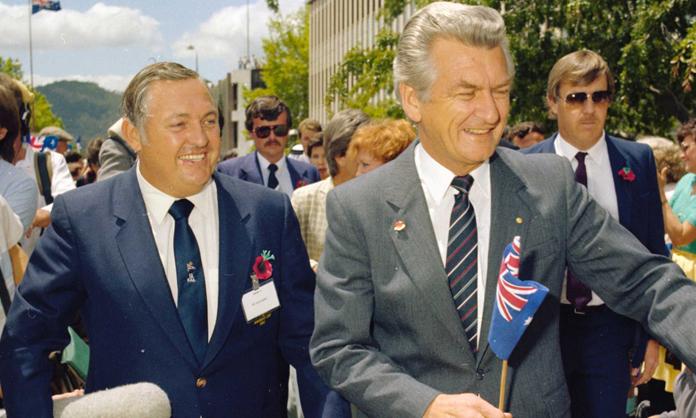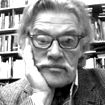R.J. Hawke, child of the manse, Methodist youth leader, self-confident to the point of bumptiousness, unquestionably clever but unburdened by scruple, fatally attracted to money and power and prepared to do anything to get his hands on both, was by 1969 hoisted into office by the left trade union bureaucracy. A middle-aged man in a hurry.
His shady dealings as a fixer and squelcher of strike activity, the full story of which is still suppressed by Australian libel law, brought him to the notice of big business as a coming Quisling. He presented himself to the working class public, particularly backward working class men, as a man of the people beer-swilling ocker, phony proletarian accent and all.
It is jolting, looking back, to see how much Hawke owed to the left of the trade union movement. When he replaced Albert Monk as president of the Australian Council of Trade Unions, he was assisted by the Communist Party – and the uproar from the right wing press was deafening. When introducing the pro-boss Prices and Incomes Accord as PM, he was again backed by the ALP/ACTU “left” and by the Communist Party, by then a political dog wagged by its union bureaucrat tail.
By 1983, he and the ALP he now led were the favoured candidates of big business, frustrated by the inability of Malcolm Fraser’s Coalition government to deliver on their demands. Fraser had been put under heavy pressure to deregulate and privatise but had dogged it, ironically out of fear of backlash by a then much more powerful labour movement.
It was left to the Trojan Hawke to float the dollar, flog off public property, deregulate financial markets and float the dollar, bringing the power of international capital to bear on government policy. Reversing the educational reforms of the Whitlam government, Hawke introduced the Higher Education Contribution Scheme, turning millions of Australian students into debtors.
During the pilots’ strike of the late ’80s, which challenged the accord by seeking wage rises outside the corporate profits-first guidelines, pilots’ negotiators were treated to the sight of Hawke getting up from the table from time to time to scurry into the next room to get his orders from Sir Peter Abeles, Ansett Airlines big shot and long-standing Hawke patron.
At a business awards ceremony during the 1987 election campaign, media mogul and brothel proprietor Kerry Packer and lifelong thief and future jailbird Alan Bond both endorsed the Hawke government. Bond said that “the government should be applauded for allowing Australian business to succeed”, while Hawke described Packer as a “close personal friend”.
“Hawke and Keating do more than enjoy the company of the new tycoons, they share their values”, journalist Brian Toohey explained in July of that year. “The Labor Party is an irrelevancy – an embarrassment that can be explained away to the people who count; a vehicle to deliver votes from those who don’t.”
For 13 years, the Hawke and Keating governments were the favoured option for big business – until the labour movement that went along with them had become a shadow of itself and the bosses felt confident to call in the Liberal Party “A” team.
The venomous pique that Hawke scarcely bothered to conceal when Keating won the unwinnable 1993 election, and his corresponding glee when he lost in 1996, tell the story of an egomaniac. The labour movement that fed him meant nothing to a man consumed by greed and malevolence.
By the ’90s, Hawke had transitioned from mere capitalist lackey to actual capitalist, part owner of CBD high rises, his sticky fingers into numerous pies, leveraging his contacts made as PM to do business with (usually odious) foreign governments. Among his best mates, all great blokes, were the Myanmar military junta and, always, Israel. He was now one of the globe-girdling corporate brigands he so slavishly idolised, to the extent that his unctuous flattery of Packer at an awards event was so self-abasing that even the subject of it expressed embarrassment.
Hawke was a big success as a big-noting union official and politician and in his shady post-politics business career. As a human he was a wretched failure. Now he’s gone, what’s left? Nothing positive: a nearly ruined trade union movement; a tertiary education system that lumps graduates with a mountain of debt; former nationalised industries – example Qantas, a sweatshop of the skies – generating super-profits for corporations.
The evils that men do live after them. If there is any good to be interred within Hawke’s grave, I will leave it to his corporate cronies, News Corporation and the Israeli embassy to do so. What he was like in his private life, although pretty awful, is not a proper subject for a political assessment. But as a public figure he has no claim to be treated with kid gloves. And we can disregard bleatings about respecting the dead, the feelings of his family and so forth. His many victims had families and feelings too.
Hawke was the worst opportunist and biggest phony (against a crowded field of competitors) that the Australian labour movement has yet produced. If we never see his like again, well and good.





